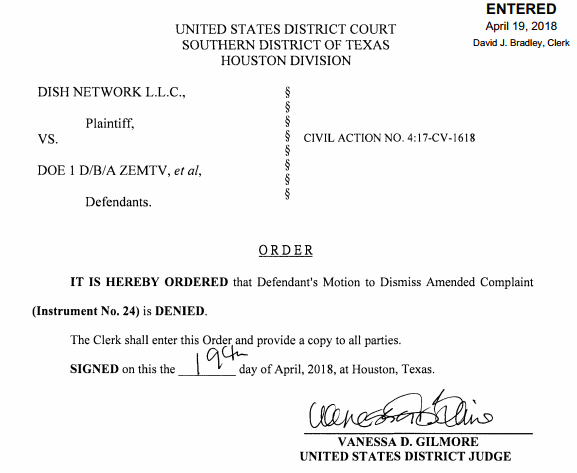Epic Responds to Cheating Fortnite Kid’s Mom in Court
mardi 24 avril 2018 à 21:31 Last fall, Epic Games released Fortnite’s free-to-play “Battle Royale” game mode, generating massive interest among gamers.
Last fall, Epic Games released Fortnite’s free-to-play “Battle Royale” game mode, generating massive interest among gamers.
This also included thousands of cheaters, many of whom were subsequently banned. Epic Games then went a step further by taking several cheaters to court for copyright infringement.
One of the alleged cheaters turned out to be a minor, who’s referred to by his initials C.R. in the Carolina District Court. Epic Games wasn’t aware of this when it filed the lawsuit, but the kid’s mother let the company know, loud and clear.
“This company is in the process of attempting to sue a 14-year-old child,” the mother informed the Court last fall.
Among other defenses, the mother highlighted that the EULA, which the game publisher relies heavily upon in the complaint, isn’t legally binding. The EULA states that minors require permission from a parent or legal guardian, which was not the case here.
“Please note parental consent was not issued to [my son] to play this free game produced by Epic Games, INC,” the mother wrote in her letter.
After this letter, things went quiet. Epic managed to locate and serve the defendant with help from a private investigator, but no official response to the complaint was filed. This eventually prompted Epic to request an entry of default.
However, US District Court Malcolm Howard wouldn’t allow Epic to cruise to a win that easily. Instead, he ruled that the mother’s letter should be seen as a motion to dismiss the case.
“While it is true that defendant has not responded since proper service was effectuated, the letter from defendant’s mother detailing why this matter should be dismissed cannot be ignored,” Judge Howard wrote earlier this month.
As a result, Epic Games had to reply to the letter, which it did yesterday. In a redacted motion the game publisher argues that most of the mother’s arguments failed to state a claim and are therefore irrelevant.
Epic argues that the only issue that remains is the lack of parental consent when C.R. agreed to the EULA and the Terms. The mother argued that these are not valid agreements because her son is a minor, but Epic disagrees.
“This ‘infancy defense’ is not available to C.R,” Epic writes, pointing to jurisprudence where another court ruled that a minor can’t use the infancy defense to void contractual obligations while keeping the benefits of the same contract.
“C.R. affirmatively agreed to abide by Epic’s Terms and EULA, and ‘retained the benefits’ of the contracts he entered into with Epic. Accordingly, C.R. should not be able to ‘use the infancy defense to void [his] contractual obligations by retaining the benefits of the contract[s]’.”
Epic further argues that it’s clear that the cheater infringed on Epic’s copyrights and facilitated others to do the same. As such, the company asks the Court to deny the mother’s motion to dismiss.
If the Court agrees, Epic can request an entry of default. It did the same in a related case against another minor defendant earlier, which was granted by the Court late last week.
If that happens, the underage defendants risk a default judgment. This is likely to include a claim for monetary damages as well as an injunction prohibiting the minors from any copyright infringement or cheating in the future.
—
A copy of Epic Games’ redacted reply is available here (pdf).
Source: TF, for the latest info on copyright, file-sharing, torrent sites and more. We also have VPN reviews, discounts, offers and coupons.
 Speaking at a news conference during March, Japan’s Chief Cabinet Secretary Yoshihide Suga said that the government was considering measures to prohibit access to pirate sites. The country’s manga and anime industries were treasures worth protecting, Suga said.
Speaking at a news conference during March, Japan’s Chief Cabinet Secretary Yoshihide Suga said that the government was considering measures to prohibit access to pirate sites. The country’s manga and anime industries were treasures worth protecting, Suga said.
 Last year, American satellite and broadcast provider
Last year, American satellite and broadcast provider 
 Nearly a decade ago, France was on the anti-piracy enforcement frontline.
Nearly a decade ago, France was on the anti-piracy enforcement frontline.